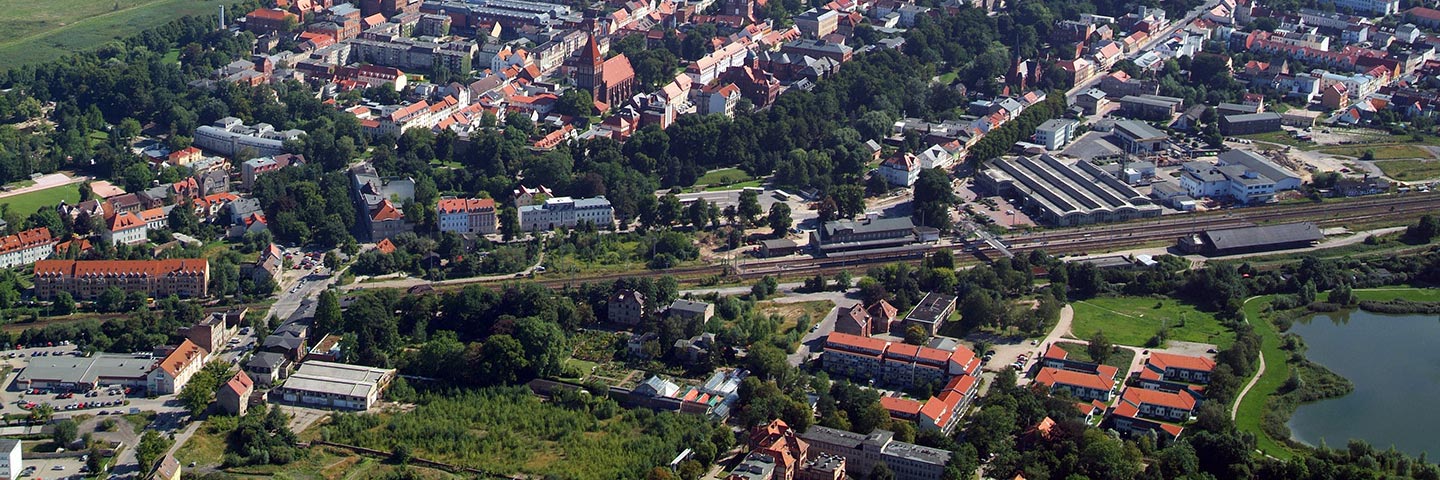News/All pieces
Rewetting, not watering down
Peatlands and paludiculture in the EU's CAP
27/11/2020 At the end of October the European Council of Agriculture Ministers and European Parliament proposed amendments for the common agricultural policy (CAP) of the European Union from 2023. Regarding peatlands these are completely insufficient. Peatlands are dealt with in the provisions for maintaining agricultural areas in "good agricultural and ecological condition". The Council of Agriculture Ministers has weakened and delayed the originally envisaged "Appropriate protection of wetlands and peatlands" to "Minimum protection of wetlands and peatlands by 2025 at the latest". The parliament, however, decided on the wording “Effective protection of wetlands and appropriate conservation of moors”, which leaves much room for interpretation. If a mere preservation of peatlands were meant, a great deal of this soil would continue to degrade through existing drainage and continue to cause alarmingly high greenhouse gas emissions. But there is a ray of hope: Paludiculture is intended to be eligible! This would equate wet farming to agriculture on drained soils and enable area-related direct payments. The information paper Peatlands in the EU CAP of the Greifswald Mire Centre and partners explains how peatlands and their sustainable use could be adequately taken into account in the CAP. The information paper GAEC 2 - Appropriate protection of wetlands and peat areas provides specific information on GAEC2 in Germany. Authors from Greifswald Mire Centre and the Landcare Germany have published an overview of the instruments for climate-friendly peatland use in Germany in “Reports on Agriculture”.
Bioeconomy with a climate protection bonus!
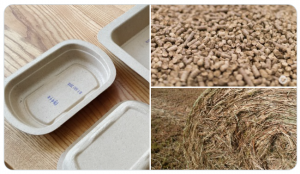
Online information day: utilisation of biomass from wet peatlands
03/11/2020On December 10th and 11th 2020, the Greifswald Mire Centre and Landcare Germany offer a free video event on bioeconomy with a climate protection bonus - utilisation of peatland biomass, each from 10 a.m. to 12 a.m. The session on the first day deals with material use e.g. as building material, that on the second day deals with energetic use and production of substrates. The information event provides a practical overview of how biomass from wet and rewetted peatlands can be used, which sales markets there are, and how these can be adapted and established for reeds, Sedges, Cattails or peat moss with presentations from companies and experts.
Biomass from wet peatlands is still a demanding raw material for which the sales markets still have to be further developed. It can contribute to climate protection in various ways: by reducing greenhouse gas emissions from the peat soil used under wet conditions, by replacing fossil raw materials and by long-term carbon storage, e.g. in building materials. Whether as packaging, moulding, insulating material, peat substitute or for generating heat or electricity - every product entails also climate protection. To register, write a short e-mail to sekretariat@lpv.de. You will then receive a dial-in link for the event. The event is organized as part of the MoKli project. The project is funded as part of the National Climate Protection Initiative (NKI) of the German Federal Ministry for the Environment, Nature Conservation and Nuclear Safety.
Bird of the year - there can only be one!
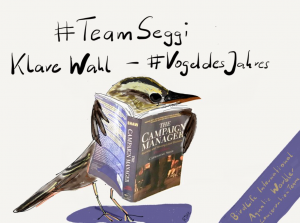
Votes required for the Aquatic Warbler
30/10/2020 The election campaign has started: The nominations for the Bird of the Year 2021 competition in Germany run until December 15, 2020. #TeamSeggi, including the Greifswald Mire Centre, is committed to “Seggi first”. Make the little bird great again and support our nomination for the Aquatic Warbler!
The Aquatic Warbler is threatened with extinction worldwide. It has not been recorded as breeding bird in Germany since 2014. The "Seggi" lives in sedge stocks of wet fens. With the extensive drainage of peat soils, it has almost disappeared from Germany. The Aquatic Warbler is also an indicator of intact peatlands and thus a small, winged ambassador for the climate. And there is hope: in the past year, Aquatic Warblers were brought from Belarus to Lithuania and resettled there in restored fens. The nomination for “Bird of the Year 2021” would not only give the Aquatic Warbler an upswing, but would draw attention to peatlands and their importance for climate protection. The Aquatic Warbler Conservation Handbook summarizes the current state of knowledge on ecology, habitat management and protection of the Aquatic Warbler. Information is also provided on the website of the Aquatic Warbler Conservation Team (AWTC), which also includes scientists of the GMC.
Solar and wind power in peatlands?
Only under wet conditions!
30/09/2020 Renewable energies such as wind and solar power are indisputably an important contribution to climate protection. However, if the systems are built on peatlands, they should go hand in hand with peatland rewetting or at least not hinder it. The new position paper on solar and wind power plants on peat soils (German only) of the Greifswald Mire Centre shows that e.g. in Mecklenburg-Vorpommern, the rewetting of peatlands could reduce emissions twice as much as the local wind power plants currently do and even seven times as much as the solar plants in the state currently avoid. A combination with the use of biomass from paludiculture on rewetted peatlands would also produce renewable raw materials as an alternative to fossil raw materials and fuels.
Three weeks + art + tiny house
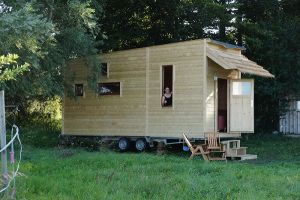
First paludiculture artist’s residency launched
17/08/2020 Creating art for paludiculture in a tiny house built from climate-friendly paludiculture materials and located right beside the wet peatland - this triple combination is the idea of the paludiculture artist’s residences, which the Greifswald Mire Centre together with the BURG Giebichenstein University of Art in Halle are offering this year. Now the first fellow has moved into the mobile home currently located on a rare restored coastal flood peatland at the Greifswald Bodden coast: Graphic designer and BURG graduate Vreni Knödler will work in the tiny house for three weeks. The Greifswald Mire Centre is looking forward to see what an artist’s delving into the complex ecological issues of peatlands, climate protection and paludiculture will bring about. The results are intended to contribute to changing the social dialogue on peatlands and to raise more awareness on their significance for climate protection and their possible sustainable use in the current perception. The surrounding landscape as well as the building materials made from paludiculture provide plenty of inspiration. The mobile and energy-efficient tiny house features, among other things, plywood made from wet alder, wall insulation made from cattails and a roof made from reed.
Paludiculture in a twin pack
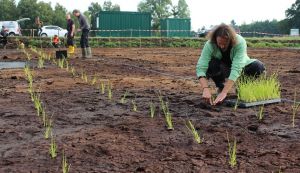
Cattail and reed to optimise peat moss growth
31/07/2020 To provide purified water for irrigating Sphagnum farming sites OPTIMOOS project now planted filter basins with a total size of 3,200 m² with cattail and reed. This is intended to promote Sphagnum as the target species , but at the same time all three paludiculture plants produce raw material for horticultural substrates. In the joint project OptiMOOS the four partners (Universities of Greifswald, Rostock and Oldenburg, Lehr- und Versuchsanstalt für Gartenbau Hannover-Ahlem) are researching the optimisation of Sphagnum farming with regard to water management, climate balance, biodiversity and product development. It is funded by the Ministry for Environment, Energy and Climate Protection of Lower Saxony and the European Regional Development Fund (ERDF). The OPTIMOOS-project was launched in 2019, but peat mosses have been successfully cultivated on 14 hectares at the peatland ‘Hankhauser Moor’ (near Oldenburg, Lower Saxony) since 2011.
All peatlands in M-V rewetted by 2050!
State press conference on peatlands and climate in M-V
28/07/2020 All peatlands in Mecklenburg-Western Pomerania (M-V) are to be rewetted by 2050, Dr. Till Backhaus, Minister for Agriculture and Environment, stated during at state press conference “Peatlands in M-V and their importance for climate protection targets" on 28th July in Schwerin. According to the fact paper Peatlands in Mecklenburg-Western Pomerania in the context of national and international climate protection targets – status quo and development potential (German only) presented by the Greifswald Mire Centre - the federal state could enable a huge potential for climate protection. Peatlands cover about 13% of its land area. The drained peatlands currently cause almost 30% of the state's total greenhouse gas emissions. Every minute an average of 11 tonnes of CO2 are emitted into the atmosphere from the drained peatlands - considerably more than the carbon sequestration of the entire forest area in M-V. The preparation and implementation of peatland rewetting and paludiculture as an alternative source of income concerns departments in several ministries. An inter-ministerial working group shall therefore promote peatland climate protection in M-V. For more information see the press release (German only) of the Ministry of Agriculture and Environment of Mecklenburg-Vorpommern.
Why the Romans called peatlands “famicose”?
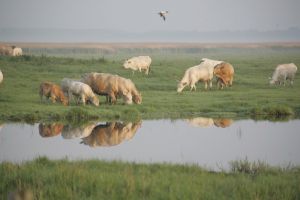
A mix of peatland ecology, philology and veterinary science solved the riddle
22/07/2020 The ancient Latin word "famicosus" occurs in the dictionary of Marcus Verrius Flaccus (approx. 55 BCE - 20 CE), the tutor of the grandchildren of Emperor Augustus, but cannot be found in any other traditional text. An extraordinary combination of peatland ecology, philology, and veterinary science has now been able to unravel its meaning: "Famex" denotes swellings of hooves of ungulates. These are caused, for example, by the bacterium Fusobacterium necrophorum. It often occurs in wet or moist habitats such as peatlands where hooves soften quickly, making them susceptible to microbial infections. The consequences can be hoof and claw diseases like interdigital dermatitis, bush rot, scald or footrot. Read more in the article by the scientists of the Greifswald Mire Centre and the State Museum of Natural History Karlsruhe.
CAP ‘gamechanger’ webinar
60 minutes, online, fully booked
04/06/2020 At 3rd June the Greifswald Mire Centre hosted a webinar on “Peatlands in the new CAP: potential and synergies for sustainable regional economies with climate and biodiversity benefits” organised jointly with Wetlands International – Europe and National University of Ireland. It raised awareness on the potential to mainstream EU climate, biodiversity, water quality and rural income objectives by effectively addressing peatland conservation, restoration and sustainable use (paludiculture) in the new CAP and other EU policies. Dedicated to MEPs, EC’s officials, farmer organisations, practitioners, NGOs and academics the 60 min webinar was fully booked. See the GMC's youtube channel for the full webinar contributions in one playlist.
GMC takes you where the peatland is
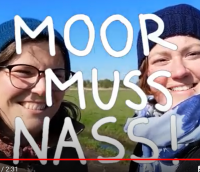
Join our session at PeatFest 31st May
29/05/2020 At 31st May peatland lovers worldwide – artists, activists, scientists and others - contribute to a 24 hour online peatland festival, the PeatFest of the activist's group re-peat.earth. At 12:45 (CET) the peatland scientists and conservationists of the GMC show their engagement for #Peatlandsmustbewet or #Moormussnass. They take you to five different places – drained and/or restored peatlands or paludiculture pilot sites. See why we cultivate typha and peat mosses… Hear about drainage damages and greenhouse gas measurements... Come with us to the beautiful Baltic coastal peatlands! And – follow Swantje Furtak on her way discovering peatlands and paludiculture. With tangy ideas and lovingly crafted animations the young filmmaker created a lively film – and path for others to understand why peatlands must be wet. There is no chance to miss out – all films will be available on our youtube channel, also after the PeatFest.
